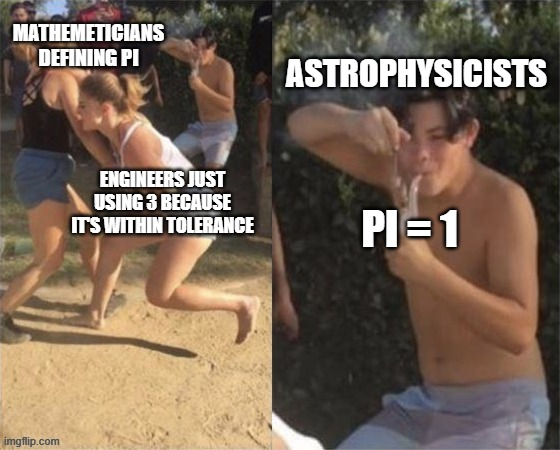this post was submitted on 17 Jun 2025
487 points (97.3% liked)
Science Memes
15272 readers
845 users here now
Welcome to c/science_memes @ Mander.xyz!
A place for majestic STEMLORD peacocking, as well as memes about the realities of working in a lab.

Rules
- Don't throw mud. Behave like an intellectual and remember the human.
- Keep it rooted (on topic).
- No spam.
- Infographics welcome, get schooled.
This is a science community. We use the Dawkins definition of meme.
Research Committee
Other Mander Communities
Science and Research
Biology and Life Sciences
- [email protected]
- [email protected]
- [email protected]
- [email protected]
- [email protected]
- [email protected]
- [email protected]
- [email protected]
- [email protected]
- [email protected]
- [email protected]
- [email protected]
- [email protected]
- [email protected]
- [email protected]
- [email protected]
- [email protected]
- [email protected]
- [email protected]
- [email protected]
- [email protected]
- [email protected]
- [email protected]
- [email protected]
- !reptiles and [email protected]
Physical Sciences
- [email protected]
- [email protected]
- [email protected]
- [email protected]
- [email protected]
- [email protected]
- [email protected]
- [email protected]
- [email protected]
Humanities and Social Sciences
Practical and Applied Sciences
- !exercise-and [email protected]
- [email protected]
- !self [email protected]
- [email protected]
- [email protected]
- [email protected]
Memes
Miscellaneous
founded 2 years ago
MODERATORS
you are viewing a single comment's thread
view the rest of the comments
view the rest of the comments

Electrical engineer. Never used 3. Always 3.14. don't really get the joke.
I just use the pi from my calculator or numpy/matlab. But I'm often too lazy for vacuum speed of light and use 3e8 m/s.
That's close enough for radio. You can't cut an antenna much closer than that precision, and it'll stretch or shrink with temperature anyway. I guess the error could add up enough to be a problem in lengths of fibre optic cables, especially as they run at about c/3
That's kind of the beauty here, you only get a relative error (0.069%) and it's mostly insignificant to the point of being smaller than your fabrication tolerances. This should also be the case for fibre optics. The error can't really add up, you scale everything to a multiple of the wavelength and you calculate the wavelength using the speed of light.
I've seen some blueprints who use 3.5. I guess it's close enough but definitely not too small
Strange. If you're going to use a decimal point, why not the right one?
You are correct, I used the wrong one for my region but according to Swedish Wikipedia (bad source) the US and UK uses a . If that is incorrect I'm happy to be corrected!
https://sv.m.wikipedia.org/wiki/Decimaltecken
LOL. That's not what I meant. Unfortunately it is what I said.
What I should have said is, if you are going to use a number after a decimal point (or comma in Europe) then why not use the right number. My bad.
A very good question, I think it was in an old DIY wood crafts book for older kids. I'm gonna dig through my book boxes to see if I find it :) Any excuse to go through them!
Edit: I'm autistic so it's not uncommon to read stuff to literally, so don't worry
Electrician over here is killing the buzz
Electrical engineer. I'm nowhere near as useful as an electrician.